"When I Arrived in Bnei Brak, I Felt Like I Was in Another World"; An Interview with Creator Asaf Shalom Leibowitz
After nearly leaving the music world due to his return to faith, Asaf Shalom Leibowitz has recently returned to music like a loving son. In a personal interview, he shares about his childhood, the miraculous divine providence he felt during a Hezbollah attack in Lebanon, his unique work with mentally challenged individuals, and the song he wrote with Aviv Geffen.
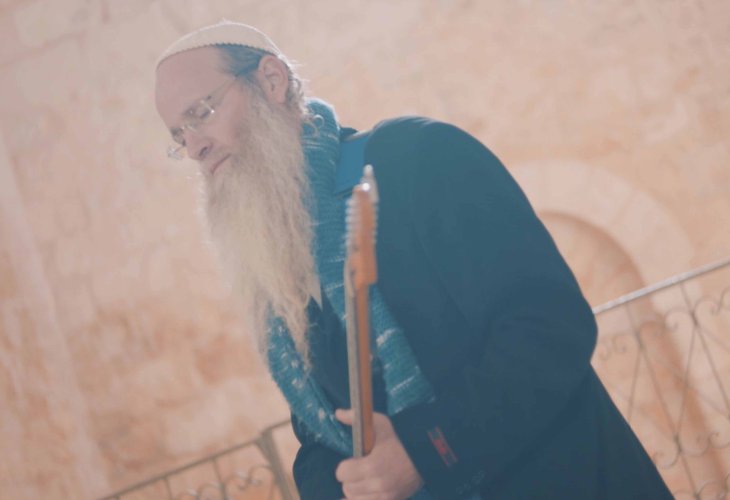 Asaf Shalom Leibowitz (Photo: Lior Liener)
Asaf Shalom Leibowitz (Photo: Lior Liener)"After high school, I enlisted in the army and served in Golani," says Asaf Shalom Leibowitz, 54, married and a father of three living in Jerusalem, musician and music therapist, as he recalls one of the moments he felt the most personal divine providence in his life.
"One of the things I remember most from the army is that night we were attacked in Lebanon. I was in one of the outposts, and suddenly Hezbollah fighters started shooting at us. In those moments, everything changes. It's a fear that's hard to describe. You're literally afraid for your life. I didn't know how or when it would end, but in those moments, you realize there's someone watching over you. It's a feeling that words can't capture, but it's very powerful. To this day, I remember its pleasantness, and it continues to accompany me throughout my life."
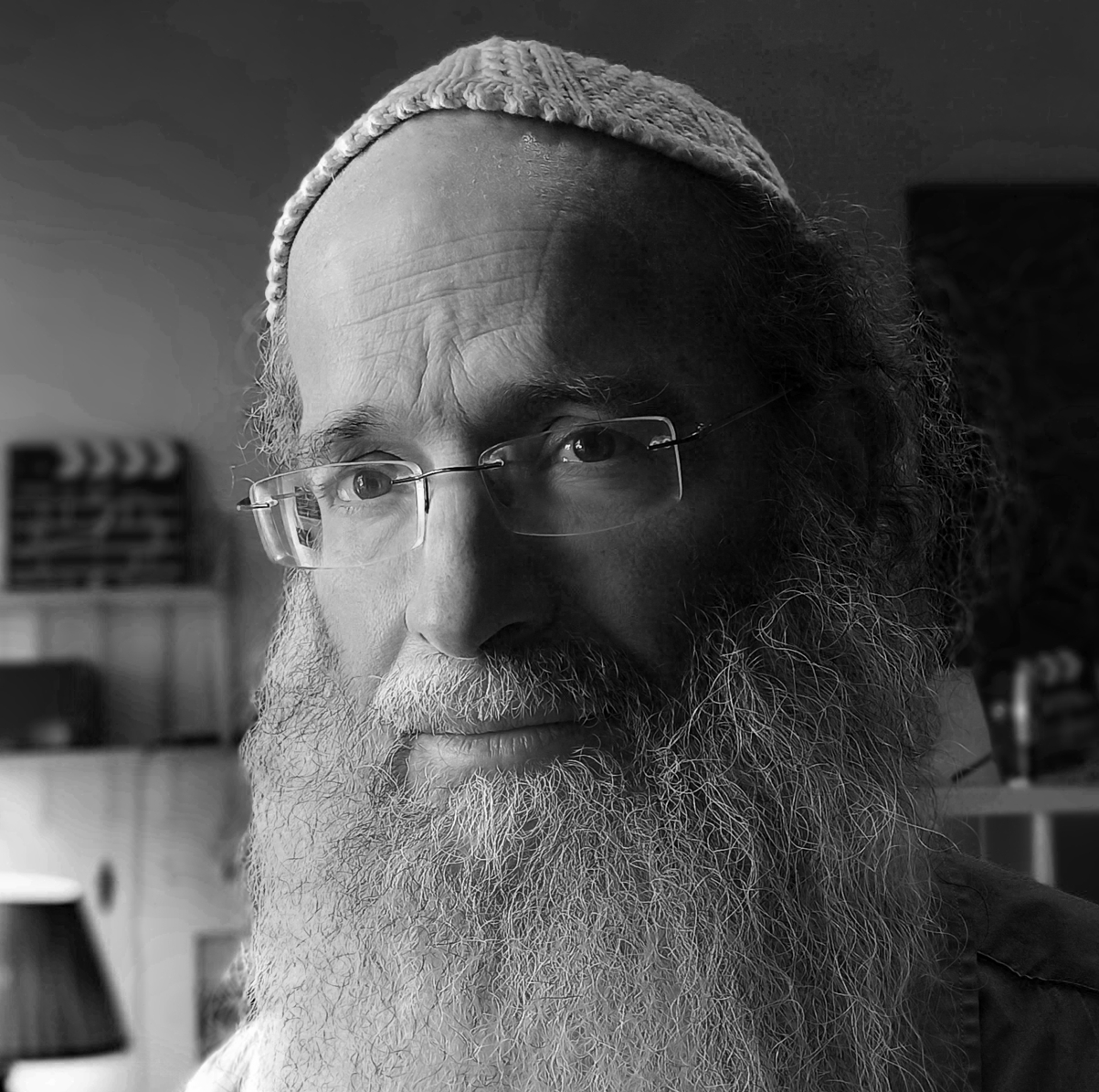 (Photo: Lior Liener)
(Photo: Lior Liener)A Friend From Another World
"I was born in Haifa to a fairly secular family," Leibowitz narrates his life story. "My father and mother were born in Israel, and their parents in Poland. My parents joined the Palmach when they were 16 and contributed a lot to the people of Israel. My father was an outsider kid in one of the kibbutzim and at some point wrote to his parents, 'Don't look for me and don't worry about me, I volunteered for the Palmach.' My mother served in the 'Breakers' Battalion, fought in Jerusalem, performed acts of heroism, and went through very difficult things. We grew up in an atmosphere of love for the land, and we traveled a lot. However, there wasn't much connection to religion. Although my mother collected Chanukah menorahs and haggadot among her other hobbies, the Passover Seder was always conducted with many people, with many songs, but not really according to the exacting laws."
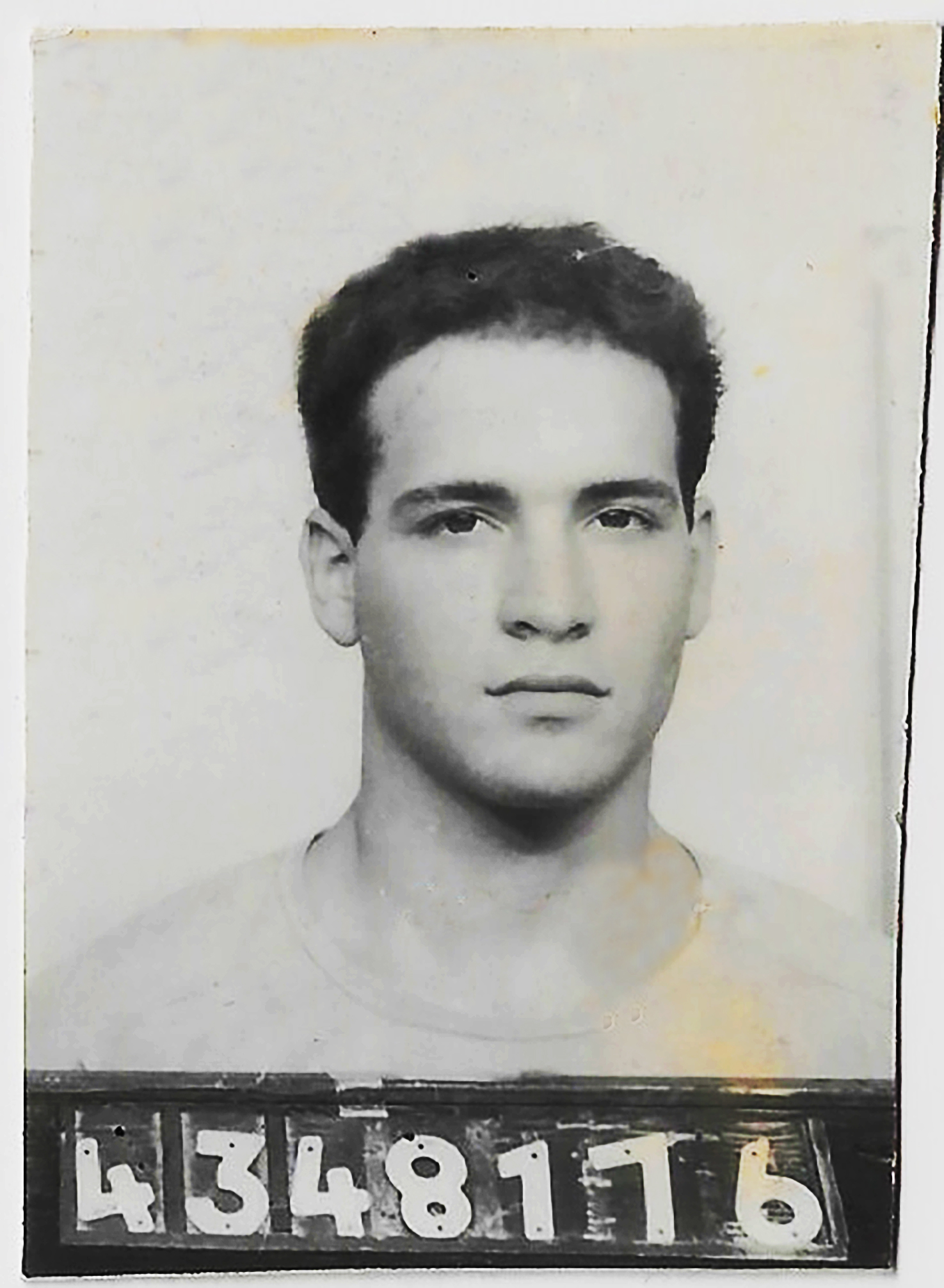 Asaf Shalom Leibowitz in his youth (Photo: Private album)
Asaf Shalom Leibowitz in his youth (Photo: Private album)"Before my bar mitzvah, my parents asked me if I wanted to be called up to the Torah, and surprisingly I was the only son who answered positively to this question. I went up to the Torah, and to this day I remember the haftarah of Parashat Balak with its melodies. In addition, there were also a few times I fasted on Yom Kippur. No one forced me. I just wanted to do it myself. I even remember one Yom Kippur when I fasted, during which I went for a run in the Carmel forests near my home in Haifa, where I had some introspections and thoughts about life's purpose. From a relatively young age, I often asked myself spiritual questions. I was quite lonely in this regard, so I developed my own inner world of drawing, music, and reading. I always felt there was something beyond the life I knew."
"Regarding the connection to music, I can say that my parents naturally loved Palmach songs and Russian folk songs. Additionally, my dad played a little on the accordion, and when I was eight, I began learning to play the accordion and recorder in music lessons at school. When I was 15, I started playing the guitar. I loved Israeli folk songs but was also exposed to music from the world, and the electric guitar suited me very well in this regard. At 16, I started performing with bands in various clubs and really connected to blues-style songs. I connected to the cry and yearning in this music. In general, the simplicity of the blues provides a lot of room for improvisation and emotion. For the touch of sound."
"Speaking of blues, I released the song 'Rabino's Blues' after a trip to Uman where I lost my suitcase, and at the last minute before the minibus left, I found it through divine providence. I felt an internal call: 'Do some blues piece, you know how to do that, and don't worry about the words because there are no better words than Likutey Tefillot, so take from there.'"
"I Felt I Had Reached the Real Thing"
Leibowitz reflects on his childhood: "The truth is that I was bored most of the time at school, and I was more involved in playing music. Books, on the other hand, I loved reading very much. I especially loved the stories of the Tannaim. I felt they had ancient wisdom, but it was very far from the way of life I knew."
When did you realize that music was a field you wanted to pursue significantly?
"As I said, music was a great love of mine since childhood, but when I started studying at Rimon, after the army, it became more serious. I lived near Rimon, in Ramat Hasharon, and during that time Aviv Geffen also studied there, and so we connected. We would visit each other, performed together, and even wrote a song together. For me, music was a world of freedom, a means of expression. I loved how it touched me. I felt how my soul was connected to it, and I especially loved the guitar. Musical instruments are something you're physically connected to. At that time, I listened to many guitarists and aspired to be a creative player. After my studies, I worked as a guitar teacher, and I continued to play in various bands all the time."
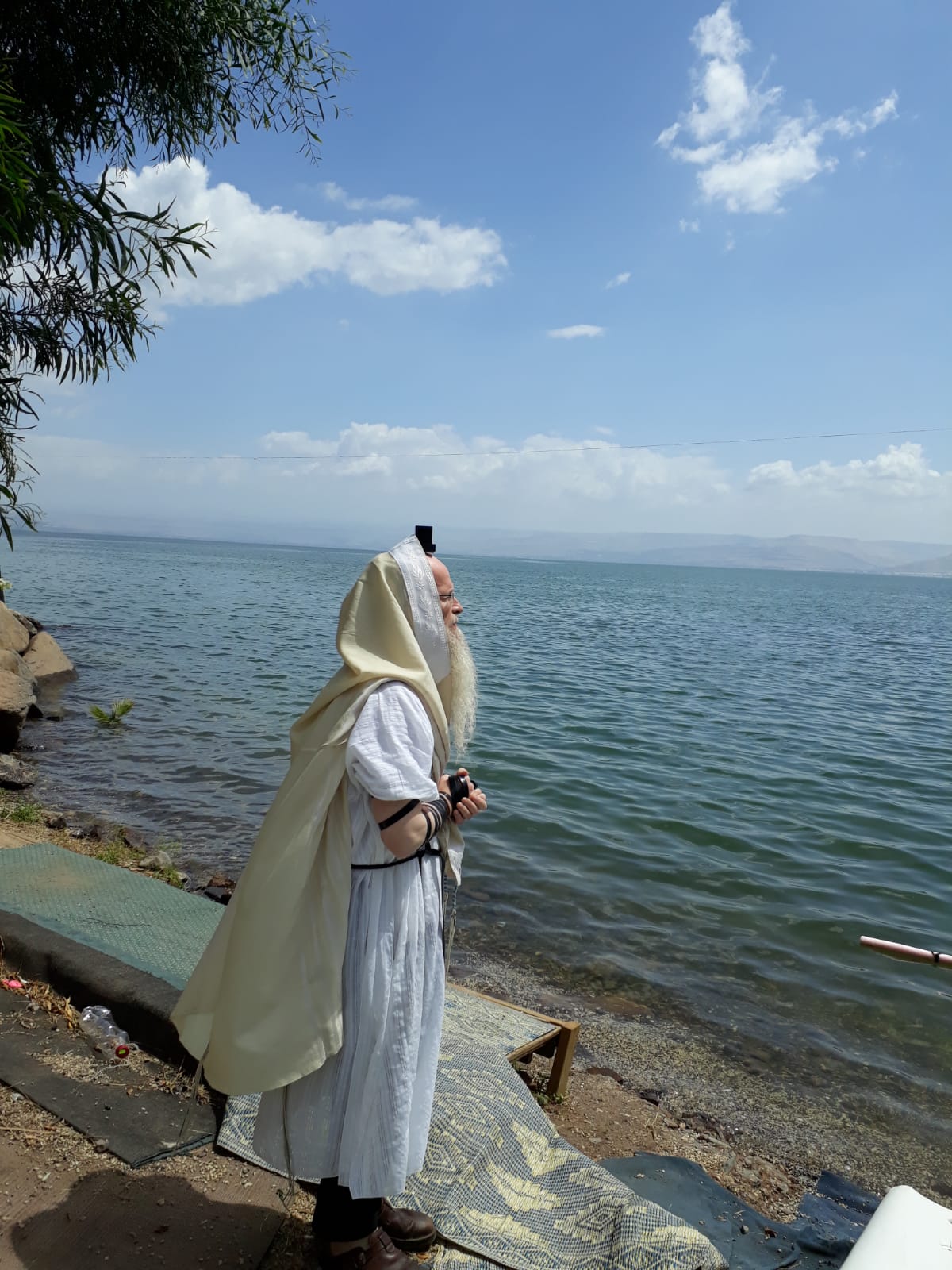 (Photo: Hadassah Leibowitz)
(Photo: Hadassah Leibowitz)"At that time, at the age of 24," says Leibowitz, "I also started the journey of returning to faith. Over time, I continued to be interested in spirituality, and at some point, I began attending a Kabbalah course taught by an observant man. It really grabbed me. We studied things from the Zohar, from the Holy Ari, and it touched me. I was looking for a purer and cleaner sound than what I knew. At some point, one of the friends in the course suggested that I move up a level and start studying Kabbalah in the Hasidic Ashlag community in Bnei Brak, and I joined him."
"When I entered Bnei Brak, I felt as if I had arrived in another world. A world I didn't know. People dressed differently, behaved, and thought differently. I didn't understand what was happening. I decided simply to try to learn, experience, and internalize, and I immediately realized that there are many treasures in this world that I didn't know existed. I continued to be exposed more and more to the life of Torah and mitzvot, and I decided to leave Tel Aviv. At this point, I moved to live with the 'Admor of Cleveland,' who lived in Raanana and took me into his home. During the time I lived with the rabbi, I returned to faith and became religious. I went through a very strong year with a powerful process. I especially remember Lag B'Omer and Shavuot as two special days that greatly influenced me. What I went through greatly worried my parents, but I kept in touch with them, and things worked out."
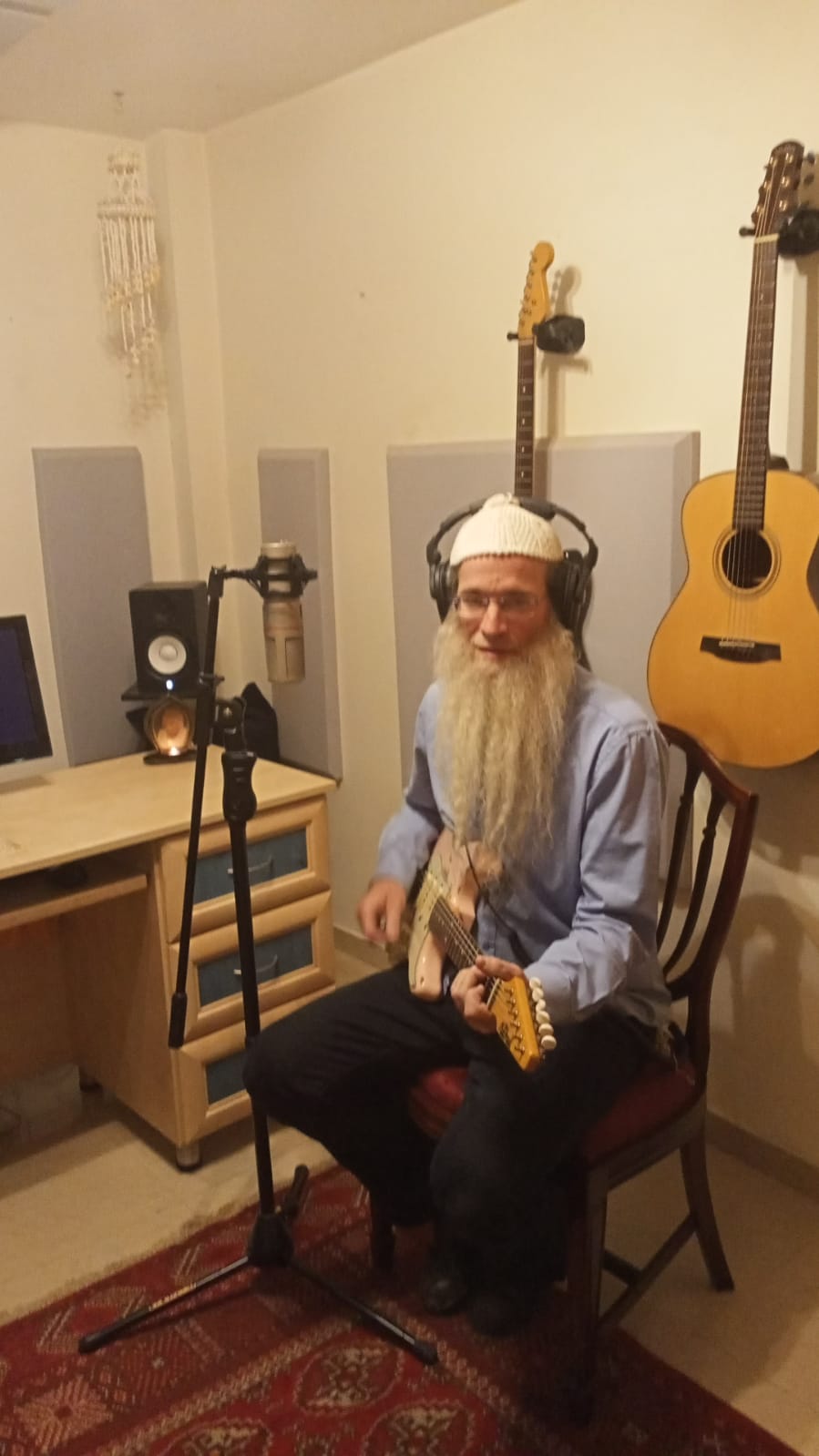 (Photo: Hadassah Leibowitz)
(Photo: Hadassah Leibowitz)"After a few months, I started studying at a kollel in Raanana, and I really enjoyed it. What ultimately made me religious was a very strong feeling that it was the right thing to do. I find it hard to explain, but that's how I felt. As a returnee to faith, in the early period, you have a very strong and unique feeling. Suddenly you understand that this is the truth. You've reached the real thing. My new song, 'Signs of Divine Providence,' speaks about this feeling that someone is accompanying you all the time. Even when I didn't observe Torah and mitzvot, it was clear to me that there is a Creator of the world, but I didn't understand why keeping mitzvot and laws was necessary. I didn't know this way of life, but when I saw that it was very orderly, deep, and stable, I wanted to accept the yoke of Torah and mitzvot. When you encounter the wisdom of the Torah up close, it's hard not to be impressed by it."
The Journeys to Jerusalem
"After studying at the kollel in Raanana," Leibowitz continues, "I studied in the Lithuanian yeshiva 'Netivot Olam,' mainly the Talmud as customary. A few months later, a match was suggested to me, a female returnee to faith, and we got married quite quickly. We moved between several homes, starting in Kfar Chabad, then to Rehovot, and then to Hod Hasharon. I collaborated there with the local rabbi, gave lessons on the weekly Torah portion and Hasidism in several synagogues, and also worked as a Torah scribe. In addition, I studied in a rabbinic kollel for several years, and, thank God, I successfully passed the rabbinical exams and also served as a military rabbi in reserves during the Second Lebanon War."
It seems at this point, music took a side role in your life
"Music was always in the background, but I mainly played at family celebrations and events in synagogues. We had children, I studied and taught a lot, and I felt those were the things that truly needed investment in life. Today I understand that wasn't entirely accurate. Music returned to play a more central role in my life thanks to discovering the teachings of Rabbi Nachman of Breslov.
"In Hod Hasharon, there was a Sephardic synagogue where quite a few Breslov Hasidim prayed, and at a certain point, I started praying with them. I loved the tunes and chants of the prayers, for which I was mostly the cantor, and I also served as the Torah reader, something I continue to do today. The connection to the biblical cantillations was natural and moving for me as a musician, and it was there that I began learning from Rabbi Nachman's teachings. Slowly, his words penetrated deep into my heart. I felt there was wonderful simplicity and depth in every word in his books, and they encouraged me greatly. After a few months, I flew with friends from the synagogue to Uman, and it was my first time there. The connection was very strong. It's hard for me to explain, but suddenly I felt I had a blessing to return to music and release my first album. In Uman, new insights opened up to me, and I understood that I could take music and continue creating from a different and better place. Rabbi Nachman talks about how a melody is something very deep. That everything in the world has a melody that revives it, and the melody can profoundly affect a person's soul. There, I greatly strengthened, and I understood this is what I am going to do."
"I had songs I had accumulated over the years, written before my return to faith, so I changed most of the words. I took these songs and started working with a producer on the album, called 'Meeting of Souls,' which was released 11 years ago. Since the album's release, I've released a few more singles and got back more into things."
Moments of Challenge
But not everything went smoothly. Leibowitz notes that during those days, he underwent a significant challenge when, after 17 years of marriage, he ended his marriage. "Those were not easy days, when I discovered who my true friends were, those who stay by your side even in times of trouble," he says. "I was still living in Hod Hasharon, and one of the friends suggested a match. It indeed suited, and by the grace of God, we got married, and the descent turned into a great ascent. Again, I felt that someone was accompanying me and that there was divine providence. My wife lived and worked in Jerusalem, so I moved to live there. The move wasn't easy because I was very connected to the people and the synagogue in Hod Hasharon, but I relied on God, and indeed the move turned out to be a great growth and healing for me. I love Jerusalem very much and make it a point to pray at the Western Wall every Shabbat.
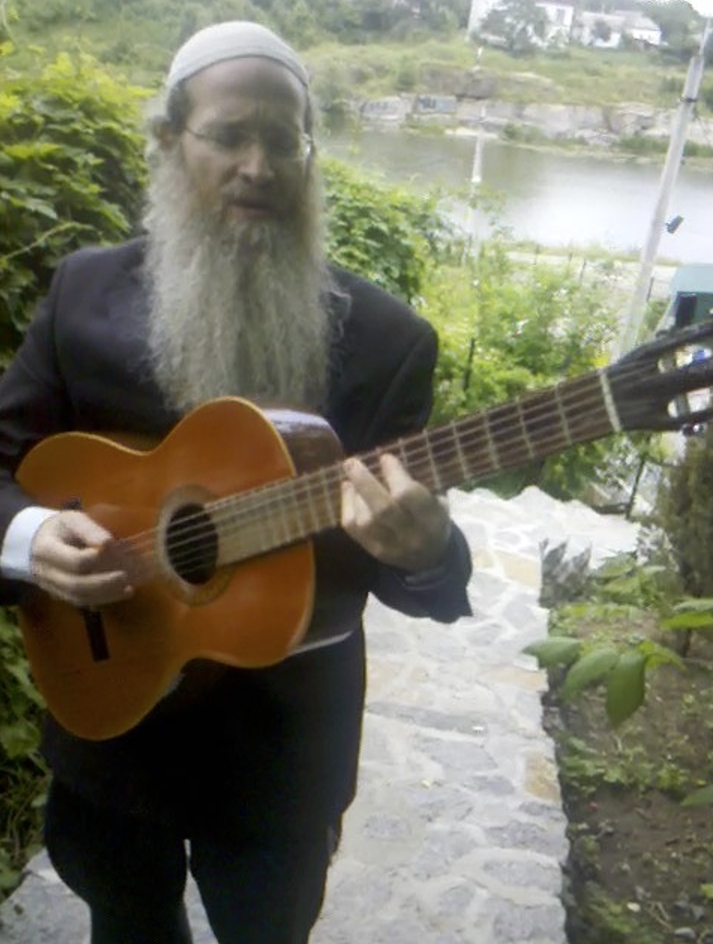 A picture from Uman taken by my wife Hadassah
A picture from Uman taken by my wife HadassahAfter some time, I started working on a project called 'Sounds of the Soul,' of 'Ezer Mizion.' It involves working with mentally challenged individuals, and I guide and accompany them musically. We have a band that I manage, and I see how significant it is for them. This is my main job, guiding and treating with music, and in addition to that, I have a recording studio, and I also teach music privately. At 'Ezer Mizion,' I understand more and more how connected the soul and music are. The core of a person is the soul; everything starts from the interior, and music is an expression of the soul that helps to feel and work with it.
"Alongside all this, I, of course, strive to set time for Torah study and continue to create. I hope my music will be the kind that comes from the heart and enters it back again. You can influence a lot of good through music. I want to create from a place of faith and hope that everyone who hears the songs will also be strengthened in faith. At the same time, I try to distance myself from the place of pride in music, from the aspect where the singer must be in the forefront and receive attention. In my view, the singer is not the main point. The music should come from a pure place, and that's what can help it shine and strengthen others."

